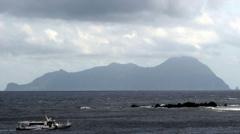For over six centuries, the residents of central Japan have revered the Miwatari, a sacred ice formation on Lake Suwa, as a sign of divine presence. Its recent absence has alarmed the community, igniting concerns over environmental changes and traditional beliefs.
Ancient Spiritual Signals: The Disappearance of Lake Suwa's Miwatari

Ancient Spiritual Signals: The Disappearance of Lake Suwa's Miwatari
In central Japan, the absence of a winter ice formation known as Miwatari is seen by residents as an ancient warning of imbalance in nature.
For hundreds of years, residents in the mountainous regions of central Japan have observed a striking natural phenomenon during winter that has significant cultural importance—the appearance of the Miwatari on Lake Suwa. Traditionally believed to be a sign of a god’s passage through their land, the Miwatari manifests as a narrow ridge of jagged ice that emerges after a period of severe cold, captivating the community that witnesses its formation.
Those living around Lake Suwa have held this belief for at least six centuries. They listen for a loud rumbling sound that heralds the Miwatari’s formation. As dawn breaks, they find the ice has risen dramatically, resembling the back of a dragon. Historically, this event brought a sense of comfort and reverence—communities would walk onto the ice to conduct rituals celebrating what they deemed a divine visitation.
However, in recent winters, the Miwatari has failed to show itself. This disappearance has left many residents unsettled, cloaking the community in a sense of dread that nature may be out of sync. The absence of the Miwatari has been interpreted as a dire warning, echoing centuries-old beliefs that tied spiritual health to environmental conditions.
The significance of the Miwatari is deeply rooted in local culture, with diligent records kept by community members since 1443. These chronicles not only track the presence of the Miwatari, but also document the health of the lake and the historical events coinciding with its appearance.
As changes in climate continue to impact weather patterns, fear grows among the people of Suwa that their environment, once predictable and reliable, is now in danger of losing its ancient rhythms.




















